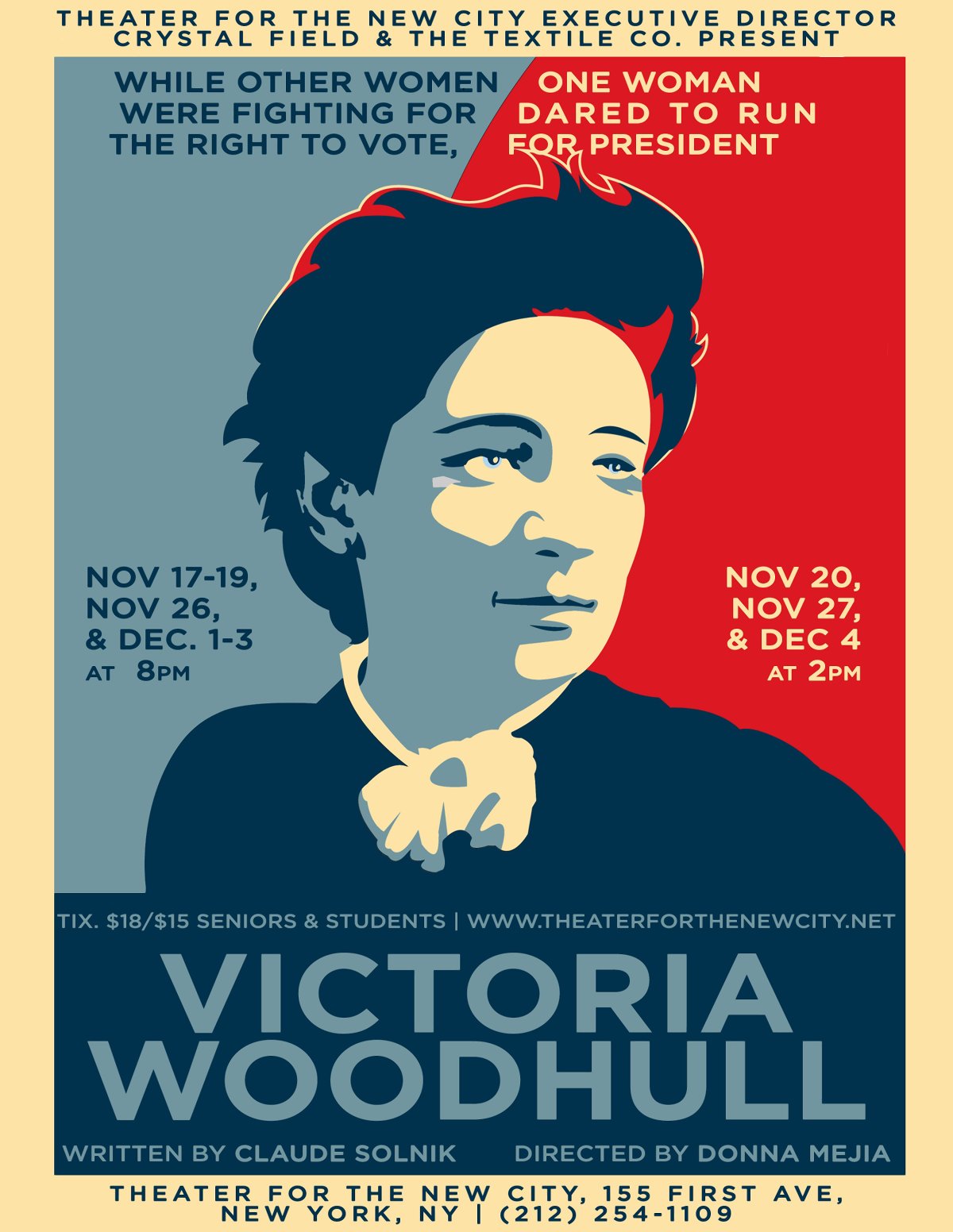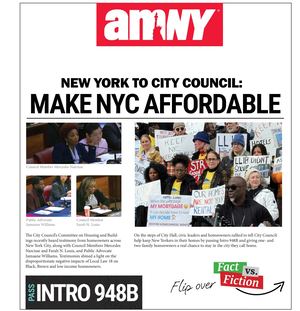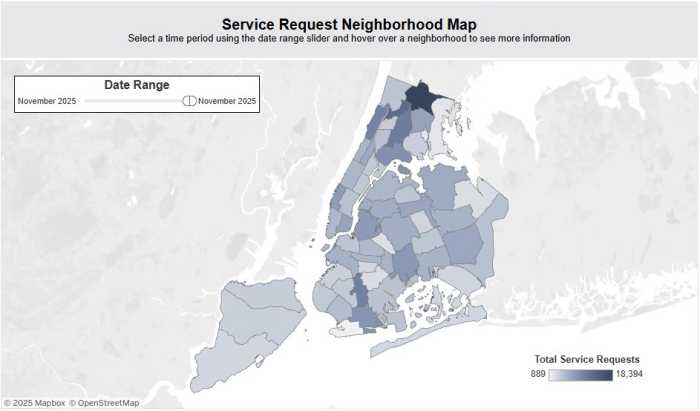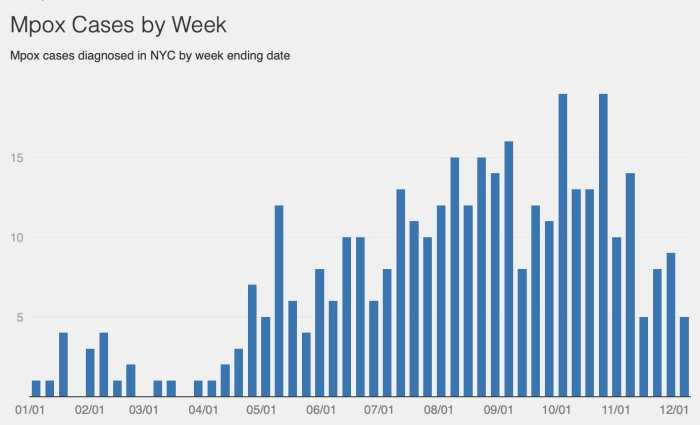
BY CLAUDE SOLNIK | The first time I heard about Victoria Woodhull, I was amazed. I was changing channels, when I saw a documentary about the first woman to run for president. I had never heard of Victoria Woodhull, but the more I heard, the more fascinated I became. How could I not know about her?
She was the first woman to own a Wall St. brokerage, testify before a congressional committee and run for president. She was the kind of person who saw opportunity where others saw obstacles. African-Americans won the right to vote in the 15th Amendment in 1870, 50 years before women won it in the 19th amendment in 1920. But Victoria Woodhull argued, if enacted properly, the 15th Amendment gave women the right to vote.
She made that argument in her publication and came up with a kind of brilliant idea. She might not be able to vote, but why not run for president?
I began writing her story. The result is a play opening at Theater for the New City on Nov. 17, just after the election.
As a journalist, I couldn’t write about her 1872 campaign for president with Frederick Douglass as her running mate. As a playwright, I can travel across time and tell her story. I found a director for the first production who couldn’t believe he didn’t know about her. We rehearsed with a picture of Victoria Woodhull hovering above us and presented the show in a Long Island church.
When I became involved with Theater for the New City, I saw a natural connection. TNC is run by Crystal Field, who I see as a kindred spirit when it comes to Victoria. I learned the theater once did a play about her.
When Hillary Clinton ran for president the first time, I thought about Victoria Woodhull. Now that Hillary Clinton may win, I feel Victoria Woodhull is in the room again as we rehearse the TNC production. Yet few people know who Victoria Woodhull is. People who see the play or hear about the production often ask the same thing: “Why don’t I know about her? How is it even possible?” Let me try to explain.
In order to understand who Victoria was and why few people know about her, it’s important to understand who she wasn’t. After the Civil War, many prominent suffragettes were intellectuals, remarkable women in their own right. Harriet Beecher Stowe, the author of “Uncle Tom’s Cabin,” was from a family of well-known preachers.
Victoria Woodhull was an outsider among outsiders. She was born in Homer, Ohio. Her father, Buck Claflin, a sort of snake oil salesman, used Victoria and her sister Tennie in his scam. They supposedly contacted the dead through séances, traveling from town to town, writing down the names on tombstones and holding séances. They cross-checked names at séances with lists from cemeteries, pretending to reach the deceased. Not wholesome. Not ethical. Not right.
Still, I don’t think we judge each other by where we come from, but what we make of ourselves. Victoria convinced Cornelius Vanderbilt to front her money to fund a brokerage and publication — which she used to attack him and his practices.
Somewhere along the way, she found her own independence, advocating for women’s rights, questioning laws governing marriage and divorce, testifying before a congressional committee and running for president.
She somehow ended up consigned to oblivion in a city so preoccupied with the present that we sometimes ignore its past. We forget that Alexander Hamilton once walked the streets of New York City. So did Victoria Woodhull. Boston seems to have a near monopoly on American history, yet much of it happened right here in New York.
When people saw the first production of this play, Victoria Woodhull became real for them. That’s what Donna Mejia, the director leading this project, and a great cast are working on doing in New York City, where Victoria once lived. Just as “Hamilton” brought one historic figure to life, Victoria Woodhull will walk the world again in this show.
Getting the play going has been an amazing experience and we haven’t even opened. Nearly 600 actors answered a casting call for a play about the first woman president. Members of the cast tell me things about Victoria I didn’t know. When they tell people about the show, they hear what I so often heard: “Why don’t I know about her?” When people find out more, they sometimes ask: “Is it true?”
Yes, it’s true.
I feel Victoria’s spirit at rehearsal, when I pass The Cooper Union where Victoria gave a big speech, in Crystal Field and in the theater itself.
Theater for the New City has presented numerous plays I’ve written. I sometimes listen as audiences exit. The greatest triumph for me with this play wouldn’t be hearing talk about the play, but about Victoria Woodhull. I hope after reading this, some of you will Google “Victoria Woodhull.” You may even find references to this play.
While Hillary runs for president, spend a moment remembering Victoria. I’ve noticed parallels, although the two women are vastly different. Donald Trump called for Hillary’s arrest. Victoria was arrested. Hilary’s personal and her husband’s sex life came under attack. So did Victoria’s. Hillary Clinton has been demonized. Cartoons portrayed Victoria Woodhull as the devil.
I don’t see this show as political, so much as bringing to the stage a remarkable (if sometimes controversial) American and an amazing story. I even started a campaign, asking people to send birthday cards for Victoria Woodhull to Theater for the New City, 155 First Ave., New York, N.Y. 10003. Her birthday was a few weeks ago, but I’m asking people to send cards until the show closes on Dec. 4.
If the spirit moves you, send or drop off a card or see the show. If you spend a moment thinking about Victoria Woodhull, I will feel victorious — and, whatever happens, the first woman who ran for president will have been a winner in this election.
Solnik is a playwright and journalist who once worked at The Villager and Downtown Express. “Victoria Woodhull” is Solnik’s play about the first woman to run for president in 1872, even before women had the right to vote. Performances will be Nov. 17-19, Nov. 26 and Dec. 1-3 at 8 p.m. and Nov. 20, Nov. 27 and Dec. 4 at 2 p.m., at Theater for the New City, 155 First Ave. Tickets are $18 / $15 seniors and students. For more information, call 212-254-1109 or go to theaterforthenewcity.net .






































